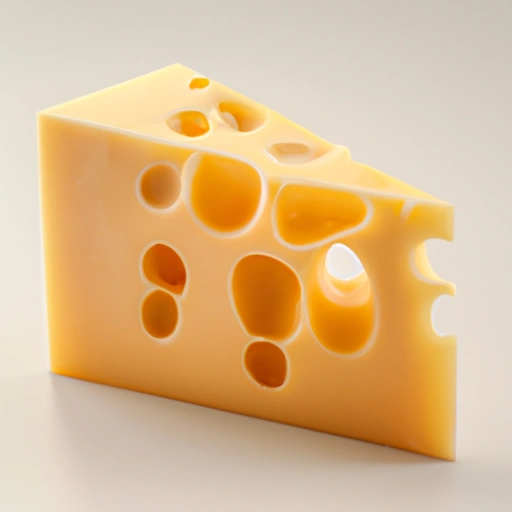Swiss Cheese
Description

Swiss Cheese is a generic name in North America for several related varieties of cheese which resemble the Swiss Emmental. It is known for its distinctive appearance marked by 'eyes' or holes throughout the cheese. Swiss Cheese has a mild, nutty, and slightly sweet flavor when young, which becomes more robust and complex as it ages.
Common uses
Swiss Cheese is widely used in sandwiches, often melted on burgers, and is a key ingredient in traditional dishes like fondue and quiche. It is also a popular choice for gratins, casseroles, and as a topping for French onion soup.
Nutritional value
Calories
Swiss Cheese typically contains about 380 calories per 100 grams (3.5 oz).
Protein
It is a good source of protein, offering about 27 grams per 100 grams (3.5 oz).
Fat
Swiss Cheese contains approximately 28 grams of fat per 100 grams (3.5 oz), with a mix of saturated and unsaturated fats.
Carbohydrates
It is low in carbohydrates, with less than 1 gram per 100 grams (3.5 oz).
Vitamins
Swiss Cheese is rich in B-vitamins, particularly B12, and also provides vitamin A.
Minerals
It is an excellent source of calcium, with about 960 mg per 100 grams (3.5 oz), and also contains phosphorus and zinc.
Health benefits
Swiss Cheese is beneficial for bone health due to its high calcium content. The protein in Swiss Cheese can help in muscle development and repair. Additionally, the B-vitamins support various metabolic processes in the body.
Potential risks
As with many cheeses, Swiss Cheese is high in sodium and saturated fat, which should be consumed in moderation, especially by individuals with hypertension or heart disease.
Common recipes
Swiss Cheese is used in a variety of recipes from classic Swiss fondues to American Reuben sandwiches, cheese quiches, and European pastries.
Cooking methods
It can be melted, grilled, baked, or used fresh in sandwiches and salads.
Pairing with other ingredients
Swiss Cheese pairs well with fruits like apples and pears, nuts such as almonds and walnuts, and is complemented by wines like Chardonnay and light-bodied red wines.
Summary
Swiss Cheese is a versatile and beloved cheese with a rich history and a wide variety of uses in cooking. With its unique flavor profile and impressive nutritional benefits, it has secured a place in both traditional and modern recipes. However, its high sodium and saturated fat content means it should be enjoyed as part of a balanced diet.